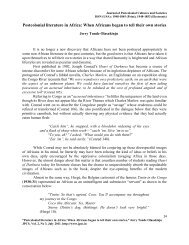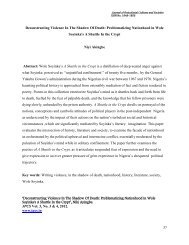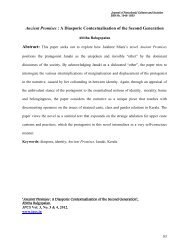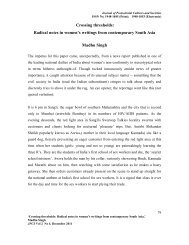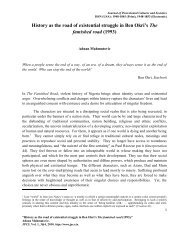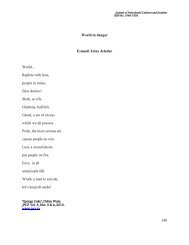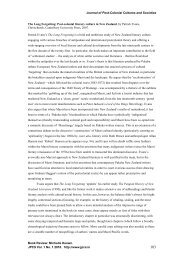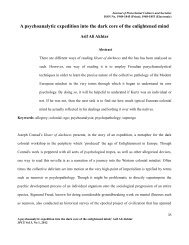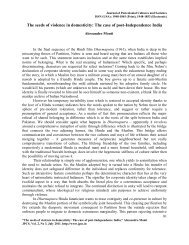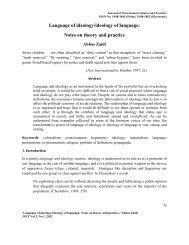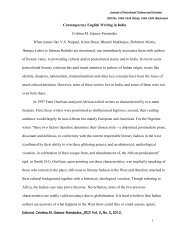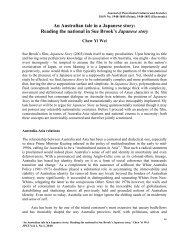Darwinist premise in the Orientalist construction of the âOtherâ - JPCS
Darwinist premise in the Orientalist construction of the âOtherâ - JPCS
Darwinist premise in the Orientalist construction of the âOtherâ - JPCS
You also want an ePaper? Increase the reach of your titles
YUMPU automatically turns print PDFs into web optimized ePapers that Google loves.
Journal <strong>of</strong> Postcolonial Cultures and Societies<br />
ISSN No. 1948-1845 (Pr<strong>in</strong>t); 1948-1853 (Electronic)<br />
The notion <strong>of</strong> <strong>the</strong> racial superiority <strong>of</strong> Caucasian race which thus obta<strong>in</strong>s a code <strong>of</strong> laws and<br />
morals only b<strong>in</strong>d<strong>in</strong>g for one part <strong>of</strong> humanity as endorsed by <strong>Orientalist</strong>/colonial project have<br />
its ramifications for imperialism, s<strong>in</strong>ce <strong>the</strong> empire that launched its imperial enterprise had<br />
erased any possibility <strong>of</strong> cultural diversity . Thorste<strong>in</strong> Veblen (1899), for example, proposed<br />
that economics be reconstructed upon Darw<strong>in</strong>ian pr<strong>in</strong>ciples. Alfred Marshall, whose<br />
Pr<strong>in</strong>ciples frontispiece recorded <strong>the</strong> same motto found <strong>in</strong> The Orig<strong>in</strong> <strong>of</strong> Species , natura non<br />
facit saltum, op<strong>in</strong>ed that “<strong>the</strong> Mecca <strong>of</strong> <strong>the</strong> economist lies <strong>in</strong> evolutionary biology . . . ” (qtd.<br />
<strong>in</strong> Leonard 2)<br />
The concepts <strong>of</strong> "struggle for existence", "survival <strong>of</strong> <strong>the</strong> fittest" and “Might is right” become<br />
<strong>the</strong> threshold concepts <strong>of</strong> <strong>the</strong> colonial and imperial schema. However, James Allen Rogers <strong>in</strong><br />
his article “Darw<strong>in</strong>ism and Social Darw<strong>in</strong>ism” remarks that <strong>the</strong> idea <strong>of</strong> <strong>the</strong> struggle for<br />
existence “was not orig<strong>in</strong>al with Malthus and <strong>in</strong> one form or ano<strong>the</strong>r had been a<br />
commonplace <strong>in</strong> Western thought” (269). In his Descent <strong>of</strong> Man, Darw<strong>in</strong> came directly to <strong>the</strong><br />
po<strong>in</strong>t: “With savages, <strong>the</strong> weak <strong>in</strong> body or m<strong>in</strong>d are soon elim<strong>in</strong>ated; and those that survive<br />
commonly exhibit a vigorous state <strong>of</strong> Health. We civilized men, on <strong>the</strong> o<strong>the</strong>r hand, do our<br />
utmost to check <strong>the</strong> process <strong>of</strong> elim<strong>in</strong>ation” (501). Darw<strong>in</strong>’s “Natural Selection” is consistent<br />
with <strong>the</strong> more accurate expression <strong>of</strong> Herbert Spencer’s “<strong>the</strong> Survival <strong>of</strong> <strong>the</strong> Fittest”.<br />
Darw<strong>in</strong>’s biological progress which echoed <strong>in</strong> Spencer's belief <strong>in</strong> social progress has been<br />
appropriated by <strong>the</strong> <strong>Orientalist</strong> <strong>in</strong>stitution, and culm<strong>in</strong>ated and materialized <strong>in</strong> <strong>the</strong> colonial<br />
project.<br />
In his anthropological classic, Europe and <strong>the</strong> People without History, Eric Wolf observed<br />
that <strong>the</strong> Western <strong>in</strong>tellectual tradition tended to view Europeans – <strong>the</strong> “people with history” –<br />
as <strong>the</strong> driv<strong>in</strong>g force <strong>of</strong> historical change, and “primitive” societies as prist<strong>in</strong>e, unchang<strong>in</strong>g<br />
survivals from <strong>the</strong> past – <strong>the</strong> “people without history” (385). Hence, we can see that<br />
Classicism and Orientalism emerged and developed as complementary concepts. Classicism<br />
was <strong>the</strong> West’s way <strong>of</strong> def<strong>in</strong><strong>in</strong>g “who we are,” while Orientalism was <strong>the</strong> West’s way <strong>of</strong><br />
def<strong>in</strong><strong>in</strong>g “who we are not.” Classicism preceded Orientalism, with <strong>the</strong> result that stereotypes<br />
about <strong>the</strong> East had been laid even before systematic <strong>in</strong>quiry had begun. (Brownell 3)<br />
Those assumptions were found <strong>in</strong> <strong>the</strong> classical Greek texts <strong>the</strong>mselves, and classicists<br />
repeated <strong>the</strong>m and began to elaborate upon <strong>the</strong>m from <strong>the</strong> eighteenth century on. Herodotus,<br />
Hippocrates, Aristotle, and o<strong>the</strong>r ancient authors had already set out some <strong>of</strong> <strong>the</strong> ma<strong>in</strong> <strong>the</strong>mes<br />
<strong>of</strong> Orientalism: Asian rulers are despotic and excessive; Asians do not care about <strong>in</strong>dividuals;<br />
Asians are faceless hordes <strong>of</strong> people who live <strong>in</strong> conditions <strong>of</strong> servitude. Plato and Aristotle<br />
were <strong>the</strong> earliest to associate Asia with despotic political systems. Hippocrates wrote,<br />
“Europeans are also more courageous than Asiatics” (qtd. <strong>in</strong> Brownell 3). Neoclassicism was<br />
an <strong>in</strong>tellectual trend that led to <strong>the</strong> <strong>construction</strong> <strong>of</strong> what we now call “<strong>the</strong> history <strong>of</strong> Western<br />
civilization.”<br />
In Orientalism (1978), Edward Said argues that Oriental Studies arose out <strong>of</strong> <strong>the</strong> need for and<br />
experiences <strong>of</strong> colonialism. The “Orient” was a cultural construct <strong>of</strong> Europe, and that served<br />
‘<strong>Darw<strong>in</strong>ist</strong> <strong>premise</strong> <strong>in</strong> <strong>the</strong> <strong>Orientalist</strong> <strong>construction</strong> <strong>of</strong> <strong>the</strong> “O<strong>the</strong>r”,’ Mohamed Hamoud Kassim Al-<br />
Mahfedi and Venkatesh P<br />
<strong>JPCS</strong> Vol 3, No 1, 2012<br />
12



